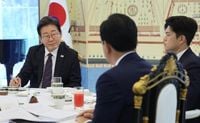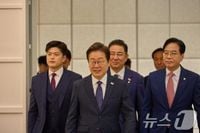President Lee Jae-myung convened a landmark dinner meeting with opposition party leaders on June 22, 2025, at the presidential residence in Hannam-dong, Seoul—just 18 days after his inauguration. This swift engagement contrasts sharply with the previous administration, where former President Yoon Seok-yeol waited nearly two years before meeting opposition leaders, signaling a fresh attempt at political dialogue and cooperation in South Korea's often fractious political landscape.
The gathering, lasting one hour and 45 minutes, was the first of its kind since May 2020, when former President Moon Jae-in last hosted such a meeting. President Lee, donning a tie blending red and blue to symbolize bipartisan harmony, expressed his eagerness for more frequent and candid interactions with opposition figures. "If possible, I want to meet more often and sooner," he said, emphasizing openness to both public and private discussions.
Attending the meeting were key figures from the People Power Party (PPP), including Emergency Committee Chairman Kim Yong-tae and Floor Leader Song Eon-seok, alongside Democratic Party of Korea Acting Floor Leader Kim Byeong-gi. The discussions covered a broad range of pressing issues, from the supplementary budget proposal to concerns over Prime Minister nominee Kim Min-seok.
President Lee highlighted the success of his recent G7 summit attendance, remarking that South Korea received "more hospitality than expected" and that "all confusions and crises in the Republic of Korea have been resolved," urging the opposition to join in navigating foreign policy challenges. On the supplementary budget, he acknowledged differing opinions as natural and encouraged mutual understanding to swiftly overcome current economic difficulties.
However, beneath the cordial atmosphere, significant disagreements emerged. The PPP voiced sharp concerns about the supplementary budget's composition, particularly criticizing the allocation of approximately 60% of funds to consumption coupons, local gift certificates, and a 1.1 trillion won debt relief program. Kim Yong-tae warned that the debt relief could engender feelings of unfairness among diligent debt repayers and potentially encourage future evasion of debt repayment.
On personnel matters, the PPP pressed for reforms to prevent repeated failures in appointment hearings, urging the government and ruling party to adopt clear principles akin to the Moon Jae-in administration's five major personnel principles. They also demanded judicial independence safeguards, including President Lee's commitment not to legislate on his own ongoing trial and to accept trial proceedings after his term should the judiciary delay them.
Song Eon-seok was particularly forthright, recounting a lack of direct response from President Lee regarding Prime Minister nominee Kim Min-seok's controversies, including allegations of "Dad Chance" nepotism and questions over his academic credentials. Song underscored the nominee's dismissive attitude toward the National Assembly's confirmation process, cautioning that such behavior risks undermining public trust and could jeopardize the success of Lee's administration. He urged reconsideration of Kim's nomination, reflecting widespread opposition concerns.
The PPP also demanded the return of chairmanships for the Law and Judiciary Committee and the Budget and Accounts Committee, which currently remain under the ruling party's control. Song pointedly reminded that the current National Assembly composition was established when Lee himself was the Democratic Party leader, calling for accountability and resolution to restore political balance.
President Lee, while open to dialogue, maintained that standing committee allocations are matters for negotiation between the ruling and opposition parties within the National Assembly. Woo Sang-ho, the President's Chief of Staff, described the meeting as a meaningful start to unguarded conversation, though no concrete compromises were reached.
Kim Byeong-gi of the Democratic Party expressed optimism, noting President Lee's approval rating exceeds 60% and urging the opposition to cooperate on the supplementary budget and appointment hearings. He also called for genuine commitment from the opposition regarding judicial reform, pointing to the need for firm action against corruption linked to the previous administration.
Beyond these core issues, Song raised broader concerns including the rapid increase in foreign ownership of South Korean real estate, particularly by Chinese nationals, and called for cooperation on easing inheritance tax, the Serious Accidents Punishment Act, and the 52-hour workweek regulations.
Despite the spirited exchange, PPP officials lamented the meeting's limited progress. One described it as "talking to a wall," branding it "show-based communication, not real communication." The Presidential Office acknowledged that substantive advances would require further discussions after each party consults internally.
The dinner meeting marked a tentative yet significant step toward political cooperation in a country often marked by partisan divides. While differences remain stark—especially on budgetary allocations, judicial reforms, and key appointments—the willingness to engage early in the new administration signals a potential shift toward more collaborative governance. As President Lee Jae-myung and opposition leaders prepare for subsequent talks, the nation watches closely to see if this dialogue can translate into tangible policy outcomes.


